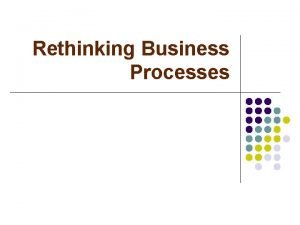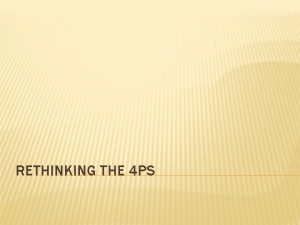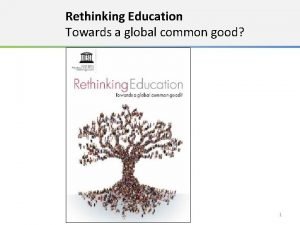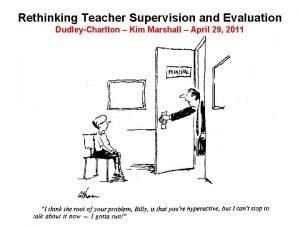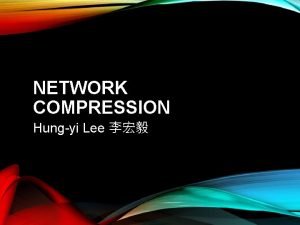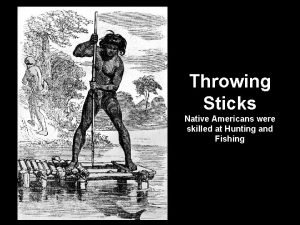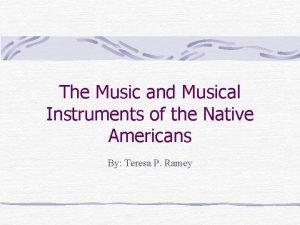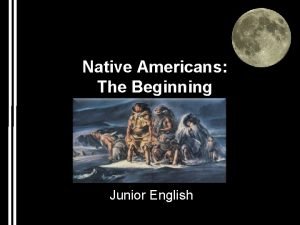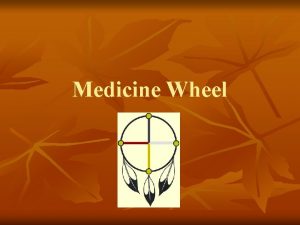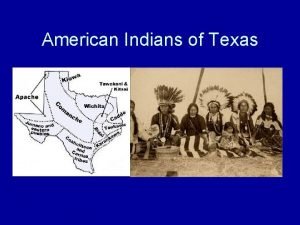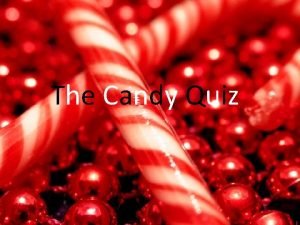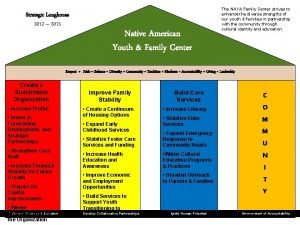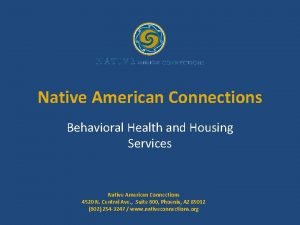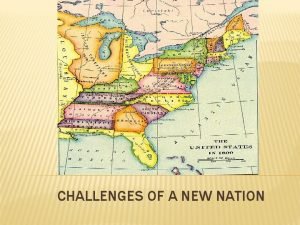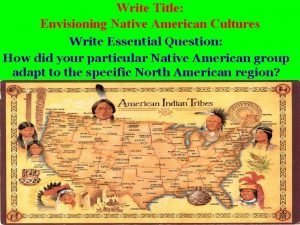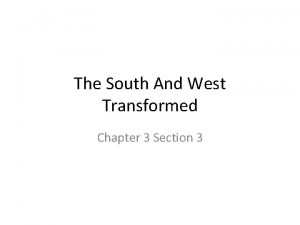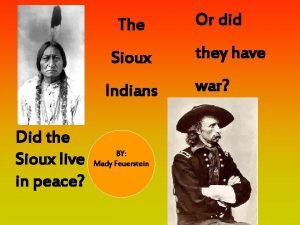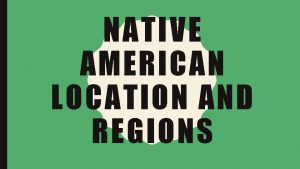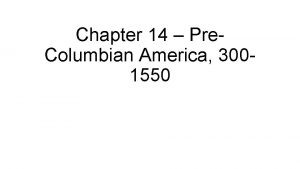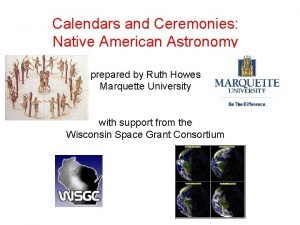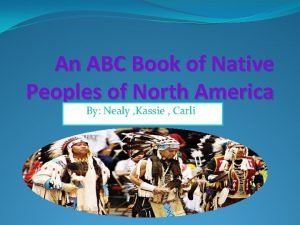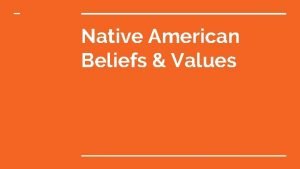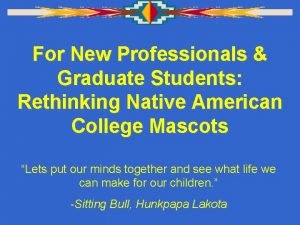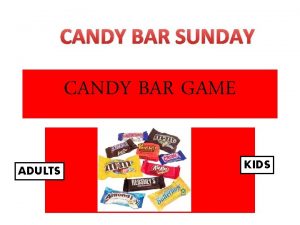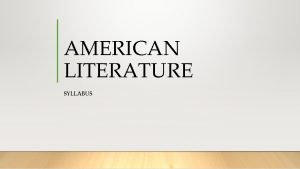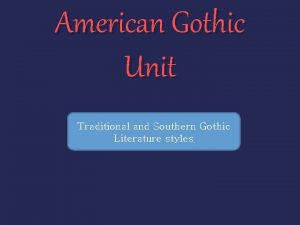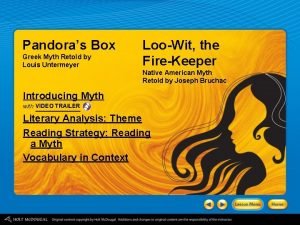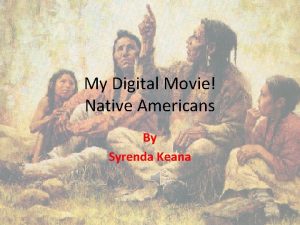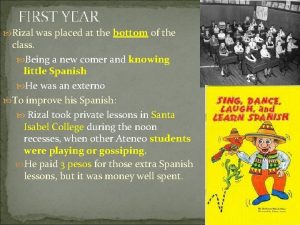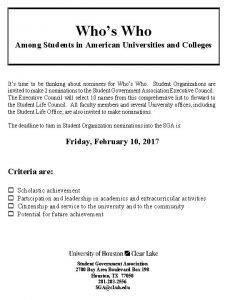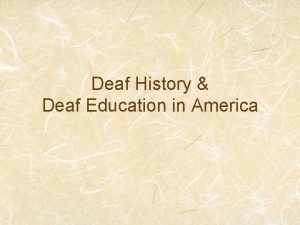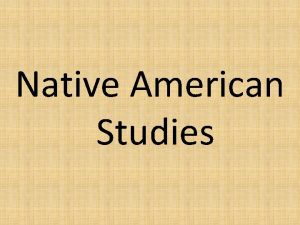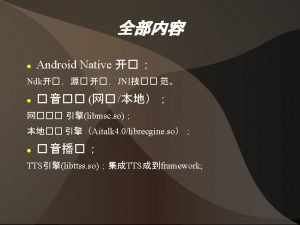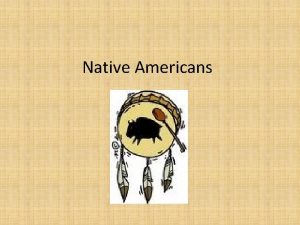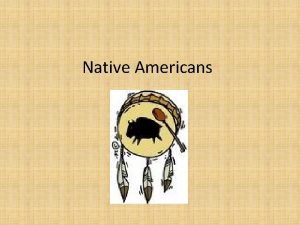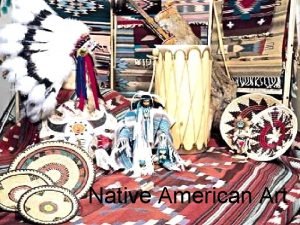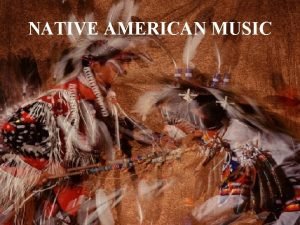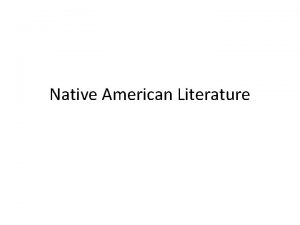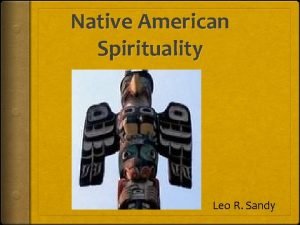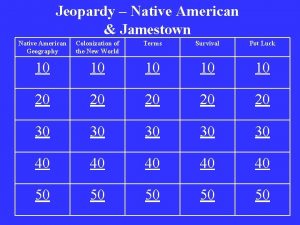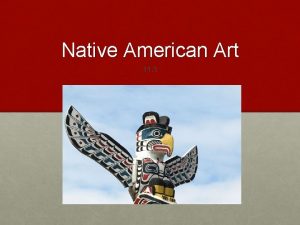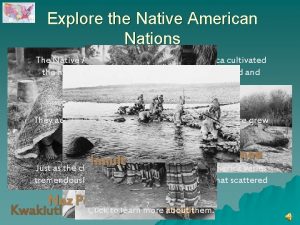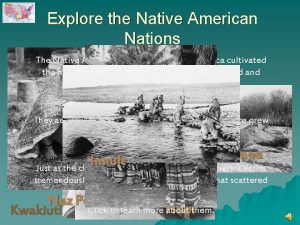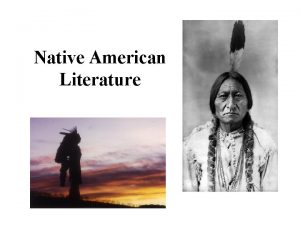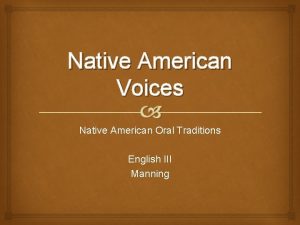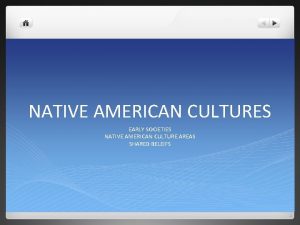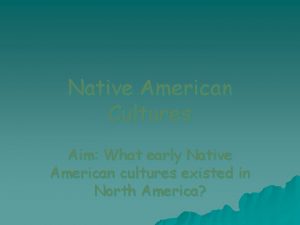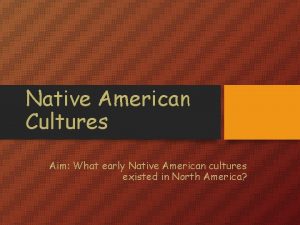For New Professionals Graduate Students Rethinking Native American



















































- Slides: 51

For New Professionals & Graduate Students: Rethinking Native American College Mascots “Lets put our minds together and see what life we can make for our children. ” -Sitting Bull, Hunkpapa Lakota

Presented & Developed By: Tracy Peterson, Cornell University Jonathon Hyde, University of Southern California

Session Goals • To engage the audience and create meaningful dialogue about the use of Native imagery/mascots and their impact on individuals • To create an understanding of the pervasiveness of Native imagery in our society • To compare and contrast Native imagery with other forms of oppressive imagery

Before we begin • Use of Terms: Indian vs. American Indian vs. Native American vs. First Nations vs. Indigenous Peoples vs. Tribal Nations • This presentation utilizes racist and disturbing imagery and words for educational purposes • Overt vs. Covert forms of oppression

Conventional Honor

What is a Mascot? Merriam-Webster Dictionary: a person, animal, or object adopted by a group as a symbolic figure especially to bring them good luck Oxford Dictionary: a person, animal, or object that is identified with a person, group, team

Caveat There are REEL Indians and there are REAL Indians.

Illini, Seminoles, Braves, Chiefs, Indians, Redmen, Red Raiders, Savages, Warriors, Fighting Sioux, Apaches, Cherokees, Moundbuilders

Why Redskin? The term refers to the bloody membrane that one saw when looking at the severed scalp of an American Indian person brought in for bounty by trappers/ colonists during the westward expansion of the United States. This bloody membrane, which was “red” in color, was associated with other “animal” pelts brought in for bounty, thus creating the term “redskin”. “So, you see when we see or hear that term. . . we don't see a football team. . . we don't see a game being played. . . we don't see any "honor". . . we see the bloody pieces of scalps that were hacked off of our men, women and even our children. . . we hear the screams as our people were killed. . . and "skinned" just like animals” -Tina Holder, Mesa, AZ

Where did Indian mascots come from? Ø Boarding schools were an attempt to prove that American Indians, conditioned within a controlled and regulated environment could give responses and behave like white people. Ø By the early 20 th century, white schools began picking up the mascot identity from these schools. Many white schools had animal mascots and the concept of the Indian as mascot fit simply and directly into this practice. Indian boarding schools were populated with what white people considered a wild animal race.

Colleges & universities that have dropped their “Indian” identity 1969 - Dartmouth College changes its mascot from "Indians" to "Big Green. “ 1970 - University of Oklahoma retires its "Little Red" mascot. 1971 - Marquette University (WI) abandons its "Willie Wampum" mascot. 1972 - Stanford University drops its "Indian" sports team name and logos. 1979 - Syracuse University retires its "Saltine Warrior" mascot. 1979 - St. Bonaventure retires its "Brown Indians" and "Brown Squaws" sports team mascots. 1988 - Siena College (Loudonville, New York) changes its mascot from "Indians" to "Saints. " 1994 - Marquette University changes its mascot from "Warriors" to "Golden Eagles. " 1995 - St. John's University changes its mascot from "Redmen" to "Redstorm. " 1996 - University of Tennessee at Chattanooga changes its mascot from "Moccasins" to "Mocs" in reference to Tennessee's state bird, the Mockingbird. 1996 - Miami University (Oxford, OH) drops its "Redskins" nickname. 1998 - Morningside College (Sioux City, Iowa) changes its mascot from "Maroon Chiefs" to “Mustangs”. 1999 - Oklahoma City University changes its mascot from "Chiefs" to "Stars. “ 1999 - Seattle University changes its mascot from "Chieftains" to "Redhawks. “ 1999 - Illinois Valley Community College (Oglesby, Illinois) retires its "Apaches" nickname. 1999 - The Quinnipiac University Board of Trustees votes to discontinue use of “The Braves” nickname.

Steps Forward 1998 - National Collegiate Athletic Association (NCAA) Minority Opportunities and Interests Committee concluded, "Indian mascots that promote Indian caricatures and mimic ceremonial rites do not comply with the NCAA's commitment to ethnic student welfare. " 1999 - A landmark victory concludes a legal battle begun in 1992 as a three-judge panel of the U. S. Patent and Trademark Office rules that the term "Redskin" is a term disparaging to Native Americans and tends to bring them "into contempt or disrepute. " The decision has the potential to strip the Washington NFL team of trademark protections. 1999 - In an action that removes all doubt about the seriousness of concerns surrounding the use of "Indian" sports team tokens, The United States Commission on Civil Rights issues a position statement calling for educational institutions to avoid use of such ethnic nicknames and mascots. 2005 – NCAA bans the use of Native American mascots by sports teams during postseason tournaments

Remaining NCAA Mascot Teams Alcorn State University (Braves) Central Michigan University (Chippewas) Catawba College (Indians) Florida State University (Seminoles) Midwestern State University (Indians) University of Utah (Utes) Indiana University-Pennsylvania (Indians) Carthage College (Redmen) Bradley University (Braves) Arkansas State University (Indians) Chowan College (Braves) University of Illinois-Champaign (Illini) University of Louisiana-Monroe (Indians) Mc. Murry University (Indians) Mississippi College (Choctaws) Newberry College (Indians) University of North Dakota (Fighting Sioux) Southeastern Oklahoma State University (Savages)

An Interactive Exercise

I have watched a cartoon that featured a native caricature.

I have watched a sporting event on television that featured an American Indian mascot.

I have attended a sporting event in person that featured an American Indian mascot.

I attended a college or university that had an American Indian mascot.

I drive or own a Jeep Cherokee, Jeep Comanche, Pontiac Aztec, Mazda Navajo, Winnebago RV or an Indian Motorcycle.

I have purchased brands of food that appropriate Native American imagery.

I have dressed up as an American Indian during Halloween, a party, or for some other event.

As a child I read or sang the song “Ten little Indians. ”

In my research I have reduced Native Americans to an asterisk.

I have used the term, “indian giver”, “chief”, “papoose”, “squaw”, “redskin”, “injun”, “prairie nigger”, “low man on the totem pole”, “sit indian Style” “indian burn” or failed to educate a person who used the term.

I did not have an issue with the appropriated imagery used by Out. Kast during the 2004 Grammy Awards.

I watched Disney’s Pocahontas and did not question any of the imagery presented.

I have colored with the “Indian Red” Crayola Crayon. Note: This color initially was India Red, over time, it became known as Indian Red, because of the popularity of American Indians in coloring books.

I have conducted business with a company that appropriates native imagery.

I have patronized an establishment that displayed a Cigar Store Indian on its premises.

I have purchased a “Wiggling Native Hula Girl” for my vehicle or ridden in someone’s vehicle who had one and not said anything about it.

What are the psychological considerations for student development? Ø Attitudes toward the use of “Indian” related mascots are indoctrinated at an early age when the individual is highly susceptible to influence and social pressure. ØThrough stereotyping and dehumanization, objectification is facilitated. Instead of being thought of as unique individuals, Native Peoples are transformed into depersonalized “things”. At work here are the same principles found in pornography which also turn real, living people into objects of a different sort. Ø“Indian” mascots “freeze” Indigenous Peoples in a romanticized historical period which ended over a century ago, and often attach violence to the group.

What are the psychological considerations for student development? ØThe generic quality of the misnomer, “Indians”, denies Indigenous Peoples the sense of pride and place derived from an understanding and recognition of one’s unique cultural heritage. ØBecause of the pervasiveness and longevity involved in the use of American Indian related mascots by schools, such uses have become institutionalized. Having been institutionalized, it becomes very difficult to recognize the discriminatory and racist practices for what they are. In YOUR view: Can an institution have a person or race as a mascot and effectively teach students about diversity or live it in their mission?

What are the psychological considerations for student development? ØJonathon’s development as a white student attending a university with a Native American Mascot. ØTracy’s experience at the University of Iowa ØOther experiences from the audience?

How are these images related to images depicted of native peoples? “The task of resisting our own oppression does not relieve us of the responsibility of acknowledging our complicity in the oppression of others. ” - Beverly Tatum















How are these images related to images depicted of native peoples? “The task of resisting our own oppression does not relieve us of the responsibility of acknowledging our complicity in the oppression of others. ” - Beverly Tatum

Strategies for Social Change • Use of this presentation • Alumni as agents of social change • Mobilize students, staff, faculty, and community members • Boycott and protest the use of mascots • Voice your opposition to your institution’s administration • Write editorials to your campus and local newspapers • Support others who share the similar concerns

We would like to thank our friends, colleagues, and allies who have given us the ability and guidance to be here and share with you our understanding of this important issue. Open Discussion trp 27@cornell. edu jonathoh@usc. edu
 Time management in graduate school
Time management in graduate school Rethinking business process
Rethinking business process Rethinking engineering education: the cdio approach
Rethinking engineering education: the cdio approach Rethinking the 4 p's
Rethinking the 4 p's Rethinking expertise
Rethinking expertise Rethinking education: towards a global common good?
Rethinking education: towards a global common good? Kim marshall rubric
Kim marshall rubric Rethinking file mapping for persistent memory
Rethinking file mapping for persistent memory Rethinking the value of network pruning
Rethinking the value of network pruning Rethinking file mapping for persistent memory
Rethinking file mapping for persistent memory Radical redesign of business processes
Radical redesign of business processes What stick
What stick Native american musical instruments
Native american musical instruments How long have native american been living in america
How long have native american been living in america Native american religious beliefs
Native american religious beliefs Native american literature characteristics
Native american literature characteristics Medicine wheel colors and directions
Medicine wheel colors and directions What are the characteristics of early american literature
What are the characteristics of early american literature Native american dwellings
Native american dwellings Superman's other identity candy bar
Superman's other identity candy bar Native american youth and family center
Native american youth and family center Native american connections housing
Native american connections housing Native american important facts
Native american important facts Native american tribes
Native american tribes What three circumstances hurt native american
What three circumstances hurt native american Where sioux lived
Where sioux lived Indian skywalkers
Indian skywalkers Native american tribes in the united states
Native american tribes in the united states Chapter 14 lesson 2 early south american civilizations
Chapter 14 lesson 2 early south american civilizations Native american calendars
Native american calendars Native american abc book
Native american abc book Native american letting go ceremony
Native american letting go ceremony Native american morals and values
Native american morals and values Belief me
Belief me A sweet sign of affection candy
A sweet sign of affection candy Southern literature syllabus
Southern literature syllabus American gothic poetry
American gothic poetry Loo-wit, the fire-keeper is a native american myth.
Loo-wit, the fire-keeper is a native american myth. Native american writing
Native american writing Keana inu
Keana inu Native american healing prayers for the sick
Native american healing prayers for the sick New graduate nurse learning objectives
New graduate nurse learning objectives Vicenta ybardolaza description
Vicenta ybardolaza description Who's who among american college students
Who's who among american college students History of deaf education
History of deaf education Fspos
Fspos Typiska drag för en novell
Typiska drag för en novell Nationell inriktning för artificiell intelligens
Nationell inriktning för artificiell intelligens Returpilarna
Returpilarna Shingelfrisyren
Shingelfrisyren En lathund för arbete med kontinuitetshantering
En lathund för arbete med kontinuitetshantering Adressändring ideell förening
Adressändring ideell förening

